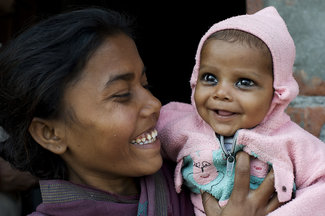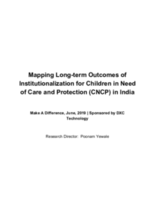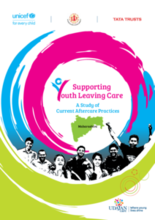

Displaying 241 - 250 of 676
The goal of this research was to challenge or validate the assumptions that underpin existing impact and change focused solutions; to combat the complete dearth of data and lack of meaningful information available in the sector about the longer term effects of institutional care on children in India; and to enable programmes both within and outside of Make A Difference to be designed on the back of benchmarked and trackable outcomes.
“Current Aftercare Practices” (CAP) is a documentation exercise designed to look at the support and services received by CLs from the objective lens of an ‘Aftercare Quality Index’(AQI), calculated using the scores within 8 domains. This report covers a total of 98 young adults from Rajasthan, comprising of 40 males and 58 females CLs, from both Government and NGO-run Child Care Institutions (CCIs) and 17 youth who, as children, availed the benefits under the Palanhar scheme of the Rajasthan Government.
A descriptive study was undertaken to assess self-esteem and its associated factors among adolescents living in orphanage and with parents at home in a selected orphanage and community, West Bengal with the objectives to assess level of self-esteem among adolescents living in orphanage and in home and to find out the associated factors related to self-esteem.
This paper presents the current vulnerabilities faced by children and the scenario of child protection in India. While discussing the legal provisions prevailing in the country, it sheds light on the socio-cultural barriers that are creating resistance within the society in making the Alternative Care model (and the process of deinstitutionalisation of children) a success. Lastly it suggests viable options that may be helpful for the same.
"As many as 880 children, including 249 girls, were rescued from 64 child care homes operating in various districts, without meeting minimum standards prescribed by the existing law," according to this article from the Himalayan Times.
An inquiry by police in the Indian state of Namakkal into an audio recording of a conversation on procuring babies for illegal adoption, "which sounded like one between a prospective buyer and a broker, uncovered a network involved in the sale of 30 newborns – 24 of them female -- from various parts of the State," says this article from the Hindu.
The "Central Child Welfare Board, in coordination with the [Nepali] National Centre for Children at Risk, local level representatives and police, rescued a total of 122 children from Sukedhara-based Aishworya Children’s Home being operated without meeting minimum standards prescribed by the existing law," according to this article from the Himalayan Times.
The government of the Indian state of Kerala is considering a plan to deinstitutionalize their residential care system, reintegrating children from child care institutions into their families of origin or finding family-based alternative care options such as foster care and adoption, according to this article from the New Indian Express.
“Current Aftercare Practices” (CAP) is a research study designed to look at the support and services received by Care Leavers (CLs) from the objective lens of an ‘Aftercare Quality Index’(AQI), calculated using the scores within 8 domains. This report covers a total of 107 CLs from Maharashtra, comprising of 74 males and 33 females, from both Government and Non-Governmental Organisation (NGO) run Child Care Institutions (CCIs).
“Current Aftercare Practices” (CAP) is a research study designed to look at the support and services received by Care Leavers (CLs) from the objective lens of an ‘Aftercare Quality Index,’(AQI), calculated using the scores obtained on 8 domains. This report covers a total of 108 CLs from Karnataka, comprising of 47 males and 61 females, from both Government and NGO-run Child Care Institutions (CCIs).





